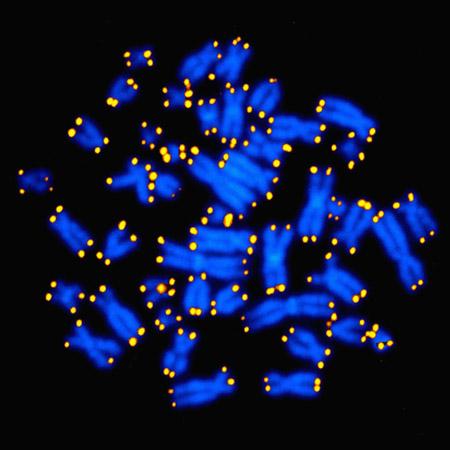Post-traumatic stress disorder linked to accelerated aging

Human chromosomes are shown in blue, with telomeres appearing as yellow pinpoints. Image courtesy of the National Institutes of Health
Writing in the May 7 online issue of American Journal of Geriatric Psychiatry, researchers at University of California, San Diego School of Medicine and Veterans Affairs San Diego Healthcare System suggest that people with PTSD may also be at risk for accelerated aging or premature senescence.
“This is the first study of its type to link PTSD, a psychological disorder with no established genetic basis, which is caused by external, traumatic stress, with long-term, systemic effects on a basic biological process such as aging,” said Dilip V. Jeste, MD, Distinguished Professor of Psychiatry and Neurosciences and director of the Center on Healthy Aging and Senior Care at UC San Diego, who is the senior author of this study.
Researchers had previously noted a potential association between psychiatric conditions, such as schizophrenia and bipolar disorder, and acceleration of the aging process. Jeste and colleagues determined to see if PTSD might show a similar association by conducting a comprehensive review of published empirical studies relevant to early aging in PTSD, covering multiple databases going back to 2000.
There is no standardized definition of what constitutes premature or accelerated senescence. For guidance, the researchers looked at early aging phenomena associated with non-psychiatric conditions, such as Hutchinson-Gilford progeria syndrome, HIV infection and Down's syndrome. The majority of evidence fell into three categories: biological indicators or biomarkers, such as leukocyte telomere length (LTL), earlier occurrence or higher prevalence of medical conditions associated with advanced age and premature mortality.
In their literature review, the UC San Diego team identified 64 relevant studies; 22 were suitable for calculating overall effect sizes for biomarkers, 10 for mortality.
All six studies looking specifically at LTL found reduced telomere length in persons with PTSD. Leukocytes are white blood cells. Telomeres are stretches of protective, repetitive nucleotide sequences at the ends of chromosomes. These sequences shorten with every cell replication and are considered a strong measure of the aging process in cells.
The scientists also found consistent evidence of increased pro-inflammatory markers, such as C-reactive protein and tumor necrosis factor alpha, associated with PTSD.
A majority of reviewed studies found increased medical comorbidity of PTSD with several targeted conditions associated with normal aging, including cardiovascular disease, type 2 diabetes, gastrointestinal ulcer disease and dementia.
Seven of 10 studies indicated a mild-to-moderate association of PTSD with earlier mortality, consistent with an early onset or acceleration of aging in PTSD.
“These findings do not speak to whether accelerated aging is specific to PTSD, but they do argue the need to re-conceptualize PTSD as something more than a mental illness,” said first author James B. Lohr, MD, professor of psychiatry. “Early senescence, increased medical morbidity and premature mortality in PTSD have implications in health care beyond simply treating PTSD symptoms. Our findings warrant a deeper look at this phenomenon and a more integrated medical-psychiatric approach to their care.”
Barton Palmer, PhD, professor of psychiatry and a coauthor of the study, cautioned that “prospective longitudinal studies are needed to directly demonstrate accelerated aging in PTSD and to establish underlying mechanisms.”
Other co-authors include Carolyn A. Eidt, Smitha Aailaboyina, and Steven R. Thorp, Veterans Affairs San Diego Healthcare System Center of Excellence for Stress and Mental Health and UCSD Department of Psychiatry and Stein Institute for Research on Aging; Brent T. Mausbach, UCSD Department of Psychiatry and Stein Institute for Research on Aging; and Owen M. Wolkowitz, UC San Francisco.
Funding for this research came, in part, from the Veterans Affairs San Diego Healthcare System Center of Excellence for Stress and Mental Health, National Institutes of Health grants R01MH099987, R01MH094151, T32MH019935, and U.S. Department of Defense, UC San Diego Center for Healthy Aging and Sam and Rose Stein Institute for Research on Aging.
Media Contact
All latest news from the category: Health and Medicine
This subject area encompasses research and studies in the field of human medicine.
Among the wide-ranging list of topics covered here are anesthesiology, anatomy, surgery, human genetics, hygiene and environmental medicine, internal medicine, neurology, pharmacology, physiology, urology and dental medicine.
Newest articles

Bringing bio-inspired robots to life
Nebraska researcher Eric Markvicka gets NSF CAREER Award to pursue manufacture of novel materials for soft robotics and stretchable electronics. Engineers are increasingly eager to develop robots that mimic the…

Bella moths use poison to attract mates
Scientists are closer to finding out how. Pyrrolizidine alkaloids are as bitter and toxic as they are hard to pronounce. They’re produced by several different types of plants and are…

AI tool creates ‘synthetic’ images of cells
…for enhanced microscopy analysis. Observing individual cells through microscopes can reveal a range of important cell biological phenomena that frequently play a role in human diseases, but the process of…





















